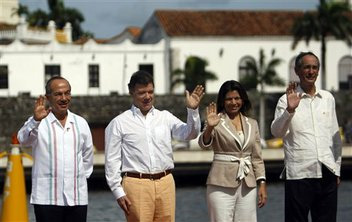
|  |  |  Americas & Beyond Americas & Beyond  
Latin Leaders Question Move to Legalize Marijuana
 Pedro Mendoza - Associated Press Pedro Mendoza - Associated Press
go to original
October 26, 2010


| | Mexico's President Felipe Calderon, left, Colombia's President Juan Manuel Santos, second from left, Costa Rica's President Laura Chinchilla, third from left, and Guatemala's President Alvaro Colon wave for the official photo at the Tuxtla Summit in Cartagena, Colombia, Tuesday Oct. 26, 2010. The Tuxtla Group is made up of governments from Central America, Mexico and Colombia. (AP/William Fernando Martinez) |  |
Cartagena, Colombia — The leaders of several Latin American nations on the front line of the battle against drugs said Tuesday that a California ballot measure to legalize marijuana would send a contradictory message from the United States.

The Nov. 2 election in California was a key topic as Colombian President Juan Manuel Santos hosted the presidents of Mexico and three other countries at a one-day summit.

Santos said that if Californians approve Proposition 19, it would require reviewing the principles that have long underpinned efforts to combat drugs in Latin America with support from Washington.

"How can I tell a farmer in my country that if he grows marijuana, I'll put him in jail, when in the richest state of the United States it's legal to produce, traffic and consume the same product?" Santos said in an interview broadcast Sunday by the Colombian radio station Caracol.

Officials in President Barack Obama's administration have said the federal government will continue to pursue its counter-drug policies and that they are looking at options for responding to the measure, which would conflict with federal laws classifying marijuana as an illegal drug.

Santos discussed the issue during a meeting on Monday with U.S. Deputy Secretary of State James Steinberg, who confirmed Washington's opposition to legalizing marijuana and pledged to keep up counter-drug cooperation with Colombia.

"It's confusing for our people to see that, while we lose lives and invest resources in the fight against drug trafficking, in consuming countries initiatives like California's referendum are being promoted," Santos said during a speech Tuesday.

"If we don't act consistently in this matter, if all we're doing is sending our citizens to prison while in other latitudes the market is legalized, then we should ask ourselves: Isn't it time to revise the global strategy toward drugs?"

Santos' position was echoed by Mexican President Felipe Calderon, who didn't directly mention the California vote but said: "It's not possible to face (drug trafficking) effectively from our national borders in an isolated manner."

In a recent interview with The Associated Press, Calderon said the California ballot initiative reflects a "terrible inconsistency" in U.S. drug policy.

"They have exerted pressure and demanded for decades that Mexico and other countries control, reduce and fight drug trafficking, and there is no discernible effort to reduce the consumption of drugs in the United States," Calderon told the AP.

In Washington, State Department spokesman told reporters that U.S. officials "understand it's an issue of concern. We understand obviously that what is being proposed for California may be in conflict with federal statute, and we'll work through those issues depending on what happens next week."

Other presidents attending Tuesday's summit of the Tuxtla Group included Porfirio Lobo of Honduras, Alvaro Colom of Guatemala and Laura Chinchilla of Costa Rica.

Chinchilla also described the California measure as "a contradictory message in the anti-drug fight" in an interview with Caracol.

She said it "would put at risk, sincerely, the consistency of the anti-drug fight," and noted that Central America is confronting a wave of violence unleashed by drug traffickers.

"If we think that each country on its own is going to successfully face this problem, we're very wrong," she said.

California's Proposition 19 would legalize recreational marijuana use and allow adults 21 and older to possess up to an ounce of marijuana. Residents could cultivate marijuana gardens up to 25 square feet (2.3 square meters) on private property. City and county governments would decide whether to allow and tax sales of the drug.

Recent polls have shown support for Proposition 19 sagging among voters. A survey by the Public Policy Institute of California found that the proposition was backed by 44 percent of likely voters while almost half said they would vote against it. The telephone poll conducted from Oct. 10 to 17 had a margin of error of 3.5 percentage points.

How the measure fares may hinge on turnout among younger voters, who heavily favor the proposition in polls.

Associated Press writer Marcus Wohlsen in San Francisco contributed to this report.
|

 |
|  |



